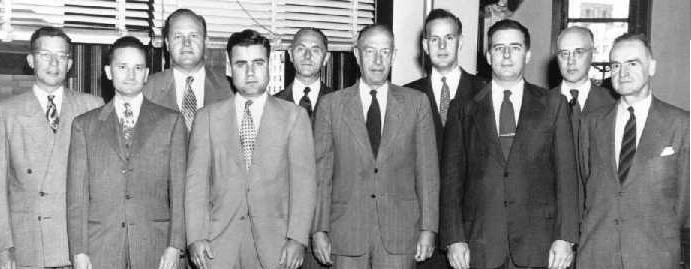LEGAL HELP: FORMING A COMPANY
WOULD SOMEONE TELL ME...? (Or... Should I know this stuff already?)

The "Legal Help" series is brought to you by:
The Professional Corporation of the Law Office of Robert A. Dinnen
4 Government Road East, Kirkland Lake, Ontario P2N 1A2
Telephone (705) 567-7979 - Fax (705) 567-7980
41 Third Street, P.O. Box 907, Englehart, Ontario P0J 1H0
Telephone (705) 544-8878 - Fax (705) 544-8444
Email [email protected]
CLEARING UP SOME OF THE MYSTERY

The Basics
- The word "company" is synonymous with the word "corporation." There is no difference between the two.
- The word "incorporation" refers to the procedure whereby a company is created and organized.
- A company is a separate entity. It has a life of its own.
- A company's liability is independent of the liability of its owners and operators.
- A company may be incorporated and operated by just one person.
- In a one-person company, although the company has a separate existence from the owner/operator, the company's owner/operator is the company's Shareholder, Director and Officer.
- A small private company can easily grow, and enjoys
special income tax treatment and other advantages
not enjoyed by unincorporated businesses.
- A small company can easily expand to accept new owners or change to accept new businesses.
Jurisdiction of Incorporation
- May be Federal or Provincial.
- Most private companies are incorporated under Provincial legislation.
- Federal jurisdiction would be chosen mostly for additional prestige.
Company Name
- May be a numbered name that is assigned by the Ministry upon filing of the Articles of Incorporation.
- A numbered name will always include the word "Ontario" if the company is incorporated under Ontario legislation.
- You may name your company anything you wish upon incorporation, provided the name is not too similar to the name of another business, and subject to certain limitations.
- Your chosen name will be searched to determine whether it is available.
- The company's proper name must appear on all documents, such as contracts, purchase orders, cheques and invoices, and must be prominently displayed at all times.
Articles of Incorporation
- The basic structure and fundamental nature of the company are set out in a document called "Articles of Incorporation" which begins the incorporation of the company when it is filed with the appropriate Ministry.
- Upon the filing of the Articles of Incoporation, the incorporation of the company has to be completed by its "organization," including the issuance of shares to the first Shareholders, election of the first Directors and election of the first Officers.
Shareholders
- Shareholders own shares in the company. In other words, shareholders own the company.
- Shareholders elect Directors to oversee the management of the company's business and affairs.
- There may be one or more shareholders. A private company is restricted in the maximum number of shareholders it may have.
Unanimous Shareholders' Agreement
- All shareholders may enter into an agreement which governs their affairs and cannot be changed without unanimous consent.
- Such an agreement can prevent actions of shareholders which are not approved by all shareholders.
- Considerations may be similar to those involved in forming a
partnership.
Directors
- Directors oversee the company's management.
- Directors need not be shareholders in the company, but usually are.
- Directors are elected by the shareholders.
- Directors elect Officers to run the day-to-day operations of the company.
- The Directors collectively are referred to as the "Board of Directors."
- The Board of Directors may consist of just one Director.
Officers
- Officers hold offices that may include President, Vice-President, Secretary, Treasurer and/or an office having some other title.
- Officers are elected by the Board of Directors.
- Officers run the daily business of the company.
- There may be just one Officer.
Minutes
- Minutes simply are a record of a meeting.
- Shareholders have meetings.
- Directors have meetings.
- Minutes have to be kept of certain types of important decisions made at meetings.
- Minutes are kept in the company's Minute Book.
Resolutions
- Resolutions simply are decisions.
- Shareholders make resolutions.
- Directors make resolutions.
- Certain resolutions must be made periodically and the Minute Book is then "updated."
Corporate Seal
- A company may have a tool called a "seal" which squeezes paper within its jaws to leave an embossed impression of the company's name in the paper.
- A company need not have or use a seal, but its use is an added touch when important documents are being signed.
Share Certificates
- Share Certificates are normally issued by the Officers of the company to the Shareholders.
- Share Certificates simply evidence the Shareholders' ownership of shares in the company.
- Records of issuances, transfers and cancellations of Share Certificates are kept in the company's Minute Book, among other records.
Minute Book
- Contains critical documentation belonging to the company, including the Articles of Incorporation, By-laws, Minutes of Meetings and other records.
Legal Services
- It would be foolish to attempt an incorporation without having the services of a lawyer.
- The advantages of being incorporated may well be lost unless the company is properly organized, documented and updated by a lawyer.

Yes, if you have or want a business, you do want to incorporate.


The "Legal Help" series is brought to you by:
The Professional Corporation of the Law Office of Robert A. Dinnen
4 Government Road East, Kirkland Lake, Ontario P2N 1A2
Telephone (705) 567-7979 - Fax (705) 567-7980
41 Third Street, P.O. Box 907, Englehart, Ontario P0J 1H0
Telephone (705) 544-8878 - Fax (705) 544-8444
Email [email protected]





